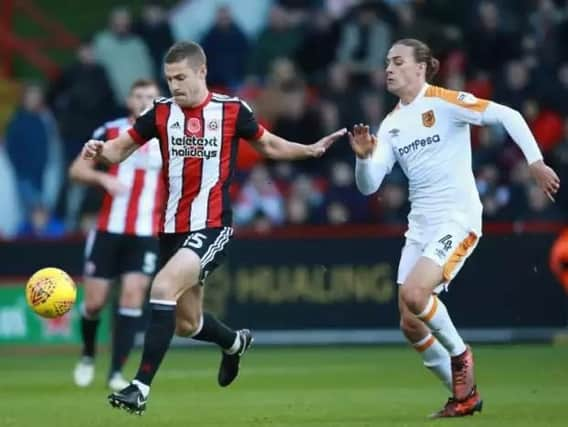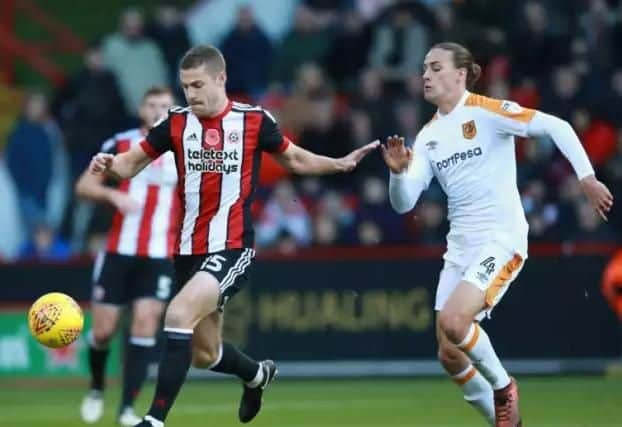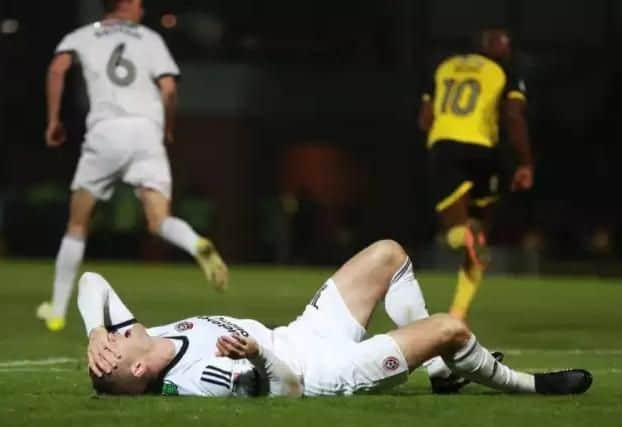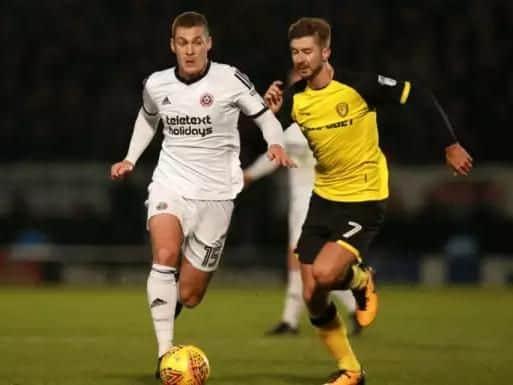Guest Sheffield United Column: Why injured star Paul Coutts is such an important cog in Chris Wilder's Bramall Lane machine


As the referee checked his watch, Mark Duffy swung the ball in from the left and from a headed clearance, Paul Coutts swooped to meet the ball full on the volley. Good volleying technique requires an eloquent sequence of footwork, body shape, a steady eye, timing and follow through. The sweetness of Coutts’ connection owed much to the fluidity of his execution. In stark contrast, Marvin Sordell’s high, flailing, studs-showing boot jabbed recklessly into the flight path of Coutts’ right shin.
The impact was both shuddering and devastating. Coutts lay distressed and prostrate while teammates and opponents alike demanded immediate medical attention, momentarily united in another player’s agony.
Advertisement
Hide AdAdvertisement
Hide AdWith hindsight we can observe that, on that chilly night, the Blades’ dream of a second successive automatic promotion was probably broken along with Coutts’ tibia. Proving ‘cause and effect’ in a team game with countless variables is fraught with difficulty; overestimating the impact of one player in a team of eleven is all too easy and regularly disproven. But everything happens in context and, despite suggestions to the contrary, United still lack ‘Liverpool-style’ investment, so the pivotal nature of Coutts’s role in their set-up made his season-ending injury nigh on impossible to contain within the limitations of Chris Wilder’s squad.
A finessed first touch and composure on the ball bestowed Coutts that rare ability to control the tempo of a game. He also provided John Fleck and others the freedom to roam and still maintain his team’s shape and balance. Few argued vociferously against the idea that, in Coutts and Fleck, the Blades possessed the most effective central midfield pairing in the Championship. Coutts’ injury meant Wilder and his staff had to contemplate much more than the replacement of one player. They had to rethink the whole team. Rather than simply replacing a faulty carburettor, they needed a new engine.
In the immediate aftermath of that Burton game, the Blades’ seemingly unstoppable forward momentum ground to a stuttering halt with a paltry return of two points from the following six games. John Lundstram had been acquired to provide central cover and Wilder backed him to succeed, despite the thankless task faced in replacing Coutts. Lundstram is a talented young player and the Blades’ downturn in results was not attributable to him. Indeed, he deserves enormous credit for performing to the level he did, given the scale of the challenge faced.
But such was Coutts’ influence on team dynamic, the Blades needed not just a new player but a different way of playing. The orchestra had to learn to play without its conductor. One of Coutts’ most commented on attributes is his ability to help his team maintain possession – always available to receive a pass, difficult to dispossess and precise in his passing. As many managers, Wilder included, would maintain, possession alone is a crude, over simplified measure of success – let us not forget that Leicester won the Premier League in 2016 with an average of just 43 per cent possession over the course of the season. To reinforce this point, examination of United’s possession stats, before and after Coutts’ injury, reveal no change at 52 per cent.


Advertisement
Hide AdAdvertisement
Hide AdA more meaningful measure of success is winning football matches and to do that, you simply need to score goals and concede fewer. Using the analytics tools Soccerbase.com, Footstats.co.uk and Tablesleague.com, I examined United’s performance, with and without Coutts, since his arrival at the club in January 2015.
Nigel Clough signed Coutts when the Blades occupied ninth position in the League One table. He had spent a prolonged spell side-lined through a bad knee injury before forcing himself back into contention at Derby. Opportunities for game time proved rare given the Rams’ embarrassment of midfield riches, which included the likes of Tom Ince, Will Hughes and Craig Bryson.
Despite lacking for match sharpness, Coutts immediately stood out as an elegant passer with the ability to knit play together. In the 2014/15 season the Blades won 47 per cent of the 19 games he started versus 37 per cent of the 25 he didn’t, in the process moving from ninth to fifth position in the table.
When Coutts was on the pitch the Blades scored at an average of a goal every 59 minutes – a marked improvement on the one goal per 66 minutes when he wasn’t on the field of play. An even greater improvement was evident in defensive capability; conceding, on average, a goal every 73 minutes without Coutts against a measly one every 87 minutes with him playing.Coutts’ defensive capability is generally understated in deference to the plaudits he receives for his contribution when in possession of the ball.


Advertisement
Hide AdAdvertisement
Hide AdThis is partly due to the unlikely sight of him flying into a challenge on the seats of his pants in the manner of, say, Chris Basham. For Coutts this would be akin to watching Beethoven perform grunge. But this doesn’t mean he’s not effective in breaking up play and nicking the ball – something he does on a regular basis using guile and timing. As Wilder said in an interview in March 2017: “Paul’s done his work off the ball as well... he works extremely hard.”
In the 2015/16 Nigel Adkins, season, Coutts was deployed, primarily, out wide on the right in order to accommodate Dean Hammond in a central role and unsurprisingly, the Scot struggled to make much of an impact, played out of position in a directionless team.
Under Adkins, United’s win percentage was similar with and without Coutts and scoring minutes actually improved when other, better-suited candidates played out wide – one scored per 71 minutes with, versus one per 59 minutes without . But any improvement in scoring capability in his absence was more than offset with a far worse goals conceded record when he was off the pitch; deteriorating to a goal conceded at an average of every 61 minutes versus every 81 minutes with him in the team. Given the roughly even number of games played with and without Coutts during the 2015/16 campaign, this is a stat that bears scrutiny, especially on the back of a similar score in the previous season.
In the 100 point promotion season of 2016/17, Coutts had a point to prove to his new manager. Wilder had transfer-listed the midfielder and overlooked him for the first three games before bringing him off the bench at half-time, with three goals already conceded, against Southend United.


Advertisement
Hide AdAdvertisement
Hide AdBenefitting from Wilder’s mantra of ‘square pegs in square holes’ and deployed in his strongest position, Coutts started 40 games in that triumphant season, The Blades won 28 of them at a win rate of 70 per cent, in contrast to the 33 per cent ratio for the six games he didn’t start. With Coutts dictating play, a goal was scored at an average of every 39 minutes versus one every 92 minutes when he wasn’t.
A similar pattern emerged with goals conceded – at a rate of one every 84 minutes with Coutts involved and one every 79 minutes when he wasn’t. Coutts had performed well in the Championship in three seasons before arriving at Bramall Lane and made his latest transition with seamless authority. In the 17 league games before his injury no team had comprehensively outplayed United and there was little doubt that they were serious promotion contenders.
Of the 16 games played by Coutts up to and including the fateful Burton game, The Blades won 11 at a win ratio of 69 per cent - almost identical to the previous, promotion season. In those games, Wilder’s men scored at an average of a goal every 54 minutes and conceded at an average of one every 93 minutes. Coutts topped the Championship rankings for touches on the ball and was second for completed passes.
Even before promotion, Wilder had expressed his confidence in Coutts and Fleck as “the best two midfielders in the league” and pledged to build his Championship team around them. His judgement, as usual, proved well founded.
Advertisement
Hide AdAdvertisement
Hide AdDeprived of Coutts’ majesty, United’s 2017/18 win ratio dropped to 30 per cent, with goal scoring effectiveness reduced to a goal scored every 77 minutes and one conceded every 71 minutes; despite Wilder successfully recruiting his January targets, losing no first teamers and the squad looking stronger.
Losing Coutts had an exponentially debilitating impact on the Blades, which went well beyond the influence of a single player. The axis with Fleck was lost and United were no longer able to dominate midfield. The precision of passing through narrow channels between defenders was weakened and, consequently, good scoring opportunities reduced (another downward trend without Coutts is both the number of shots per game and the ratio on target).


While Lundstram and Lee Evans are effective in their own right, they have been unable to replace the impact of, arguably, one of the most accomplished midfielders outside of the Premier League, based on his form prior to injury. In truth, they faced a nigh on impossible task.
In his United career, to date, spanning three managers, 110 league starts and 11,227 league minutes, Coutts has won 58 per cent of the games he started. When on the field of play, his team has scored at an average of just under two goals per game and conceded just less than a single goal per game – more or less what Newcastle achieved in winning last season’s Championship and what Wolves will achieve this time round.
Advertisement
Hide AdAdvertisement
Hide AdOne good player does not make a team but in Coutts’ case, there is evidence to suggest that one bad tackle did break a dream.
All being well, he will be back as good as new, next season, ready to orchestrate another promotion push, if it doesn’t happen this time around. Coutts deserves the opportunity to ply his trade in the top flight and the Premier League would be all the better for him.